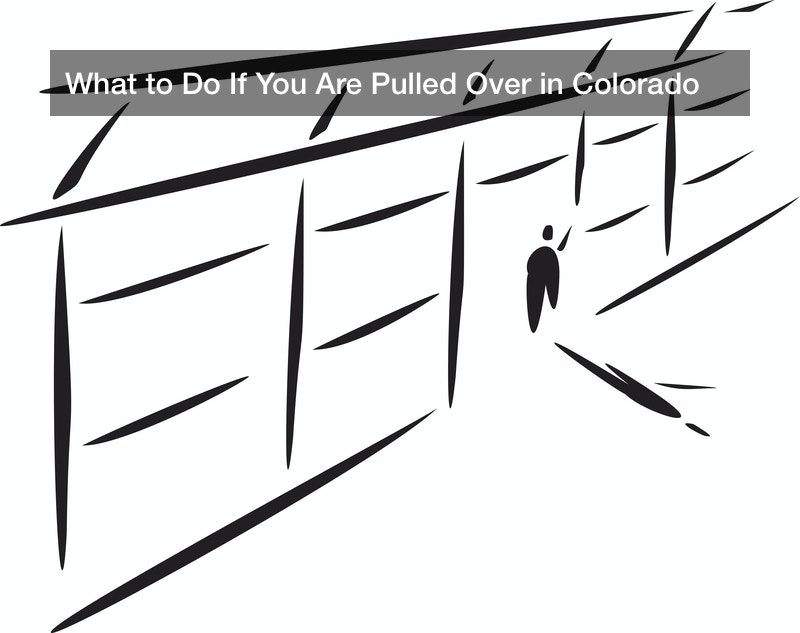
Did you know that drunk driving claims over 10,000 lives each year in the U.S.? It’s a sad truth that plagues the country. It’s no wonder that offenses for driving while intoxicated are so strict. And yet, drunk driving isn’t the only reason you may get pulled over in your adult life.
Seeing those red and blue lights flashing behind you can be terrifying. However, do you know what’s even scarier? Not knowing how to react when getting pulled over. You can get pulled over for a variety of reasons. Careless driving in Colorado is one such reason. Avoid this terror and continue reading. Here is how you handle getting pulled over by the police.
Know Your Rights as a Driver and Citizen
Upon seeing those flashing lights, take a deep breath and veer off towards the side of the road. Better yet, look for a public place to park, such as a well-lit gas station. Place your car in park and roll your window down. Look for your license and registration and place both hands on the steering wheel. Wait for the officer to approach you. Keep in mind that pulling over immediately is not an admission of guilt, so it’s best to be swift. This can make your encounter with the officer better, as they’re likely to see you as more of a law abiding citizen. Then, turn your engine off, so it doesn’t seem like you’re about to speed off into the sunset! Worst case scenario, if you go to prison, you can hire a bail bondsman.
If it’s nighttime, remember to turn on the overhead light. This is another way you can show the officer that you have nothing to hide.

If someone is sitting in the passenger seat, ask them to place their palms on the dash. It’s important that you stay calm throughout this encounter. The officer who pulled you over may ask you a series of questions. Answer them as honestly as you can. They may ask you these following questions.
- where are you currently driving to?
- have you had any alcohol?
- have you used any drugs recently?
- are there any dangerous weapons in the car that could harm or injure them?
Allow the officer to do most of the talking, and respond only when the conversation warrants it. For example, if they ask to see your driver’s license, respond with a quick ‘yes, officer.’
If they ask you to leave your vehicle, know your Fifth Amendment. This amendment establishes your rights to remain silent. You may also refuse self-incrimination. This means that when the officer pulls you over, you are under no obligation to provide anything else aside from your license, legal name, registration, and document of your proof of insurance.
Furthermore, your passenger also has these same rights. They do not have to provide any type of information, including a proof of I.D. or even a name.
In summation, when careless driving in Colorado, an officer CAN ask the driver to:
- Show a legal auto insurance card, vehicle registration, and license
- Get out of the vehicle
However, they can’t perform the following acts, and doing so without your permission is against the law.
- They can’t search your vehicle without a court mandated warrant.
- They can’t use force to make you answer questions.
- They can’t force you into taking any field sobriety tests — unless they are arresting you.
- Lastly, they cannot ask you about your immigration status
Your Status: Immigration
If you are caught careless driving in Colorado, this may be one of the questions the officer asks you. However, keep in mind that only an immigration enforcement officer can ask you about your immigration status. There is no legally binding decree that you must answer a field officer. Do not answer these questions without a criminal attorney or general law lawyer present.
Say as little as possible, so you are not coerced into saying something that can lead to your arrest.
The Field Sobriety Tests and Taking a Breathalyzer Test
If you are caught careless driving in Colorado, an officer has every reason to believe that you are driving while intoxicated. For example, if you swerve into traffic, are driving the wrong way on a road, speed, or trailblaze through a stop sign, the officer will turn on their police dash cam and pull you over.

Once you’ve pulled over, they may ask you to take a breathalyzer test. This is where things can get complicated. If you are 21, the legal drinking age in America, or older, you may refuse the test without any consequences. However, if you are under the legal drinking age and caught careless driving in Colorado while intoxicated, you risk license suspension or even time in jail.
In Colorado, it’s wise to take the test if you have not been drinking. If you blow a .05% BAC, the officer will likely let you go. However, if you have been drinking, and refuse the test, the officer will have probable cause and likely arrest you on the spot.
The Definition of Probable Cause
Probable cause is defined as visible evidence that a crime has taken place. There must be a logical reason to prove the officer’s suspicion. In the case of careless driving in Colorado, this can include the officer smelling alcohol on your breath. They will also have probable cause if you refuse the preliminary breath test.
How You Will be Charged
If you are pulled over for drunk or careless driving in Colorado, here are the following charges the officer can impose.
- UDD is underaged drinking and driving
- DUI is issued when you are caught driving under the influence, and your blood alcohol content is at a .08% or higher.
- DWAI is driving while impaired and your BAC must be between a .05% or a .08%
Why You Should Challenge Probable Cause in Court if Arrested
If you are arrested for drunk, careless driving in Colorado, you have to comply with all post-arrest tests. These exams can include a chemical test that will examine your BAC, through a blood or urine sample. If you are over the age of 21, most attorneys would suggest to refuse the test and take your chance with getting arrested. You will need a bail bond, but you have a better chance in court.
Understanding Vehicle Searches When You’re Pulled Over
If you have been pulled over for careless driving in Colorado, an officer cannot search your car without a warrant, or without your permission. This warrant can only be obtained by following the court’s standard procedure.
However, there are some exceptions for an officer searching your car without a warrant.
For example, if they can see evidence in open view, they have a cause to search. Evidence can include drugs, weapons, or an open container of alcohol.
However, they cannot pressure you into allowing a search with threats.
The bottom line is that you should not consent to a search without a warrant if you are pulled over.

When Are You Free to Leave?
After getting pulled over, it’s natural to wonder when you’re free to go. You don’t want to risk driving away while the officer still needs you to stick around.
After providing the proper documentation, you are free to go. Ensure the officer is not writing you a citation, though, as you’ll have to take the ticket with you to court.
By law, if they don’t have a reason to arrest you, they cannot detain you.
Tips for a More Pleasant Encounter
Being pulled over by the police is never fun. However, things can go south if you don’t cooperate. For the smoothest interaction possible, always do these next few things.
Be Polite When Speaking to the Officer
You’ll have a harsher encounter if you are rude to the police officer, therefore do not get hostile with them. Answer their questions truthfully, and treat them with respect.
Refrain from Making Small Talk
Inversely, you don’t want to talk their ear off. Refrain from making small talk. Officers do not pull over drivers to hear about their days or talk about their personal lives. Additionally, anything you say can be held against you in a court of law, so it’s best to only speak when spoken to.
Comply With the Officer
Comply with reasonable requests. For example, if the officer asks to see a form of I.D., hand it to them through your open window.
Don’t Drive Drunk; It Will Cost You
While it’s important that you know these rights backward and forwards, driving drunk is NEVER advisable. There is always a way to avoid endangering yourself and the lives of others. Before going out, ensure you have enough money for a cab ride home. You can also have a designated driver in your friend group. If you don’t meet any of these requirements, simply stay home. It’s not worth it! Other consequences of driving while drunk can include five days to a year in jail. Imagine this going on your record. Imagine, losing an entire year of your life while away in jail. You won’t be able to fall asleep in your bed or spend time with your friends and family.
You also risk paying a hefty fine. Your first offense DUI can cost up to $1000. Wouldn’t you rather spend that much money elsewhere?
One of the worst consequences of driving drunk may be a license suspension. This suspension can last up to nine months. Losing your license can make driving to work impossible. You’ll be riding the bus and asking for rides from friends for the entirety of a year.
Community service is another option. You may also have to take an alcohol remediation course to obtain your license if you happen to lose it.
How to Stop Careless Driving in Colorado
Careless driving in Colorado, whether you’re drunk or texting, is highly dangerous and should be avoided at all costs, even if you have audio visual solutions like sensors. It’s the driver’s responsibility to be alert when behind the wheel. Refresh your memory on how to be a better driver by following these guidelines.
Put Your Phone on Airplane Mode
People can attribute their careless driving to using their cellphone. Therefore, if you want to be safer on the road, put your phone into airplane mode to silence all the notifications and reduce the chance of distracted driving.

Never Drive When You’re Tired
Whether you’re driving a car or a semi truck, driving while you’re feeling exhausted is just as dangerous as driving while under the influence! Therefore, only get behind the wheel when you’re well rested. If you start to feel tired when driving, pull over immediately. Take a quick nap, eat a snack, play some music, or blast your A.C. to wake you up.
Conclusion
In conclusion, careless driving in Colorado is about as dangerous as not receiving firearm education. Don’t put yourself in this position.



